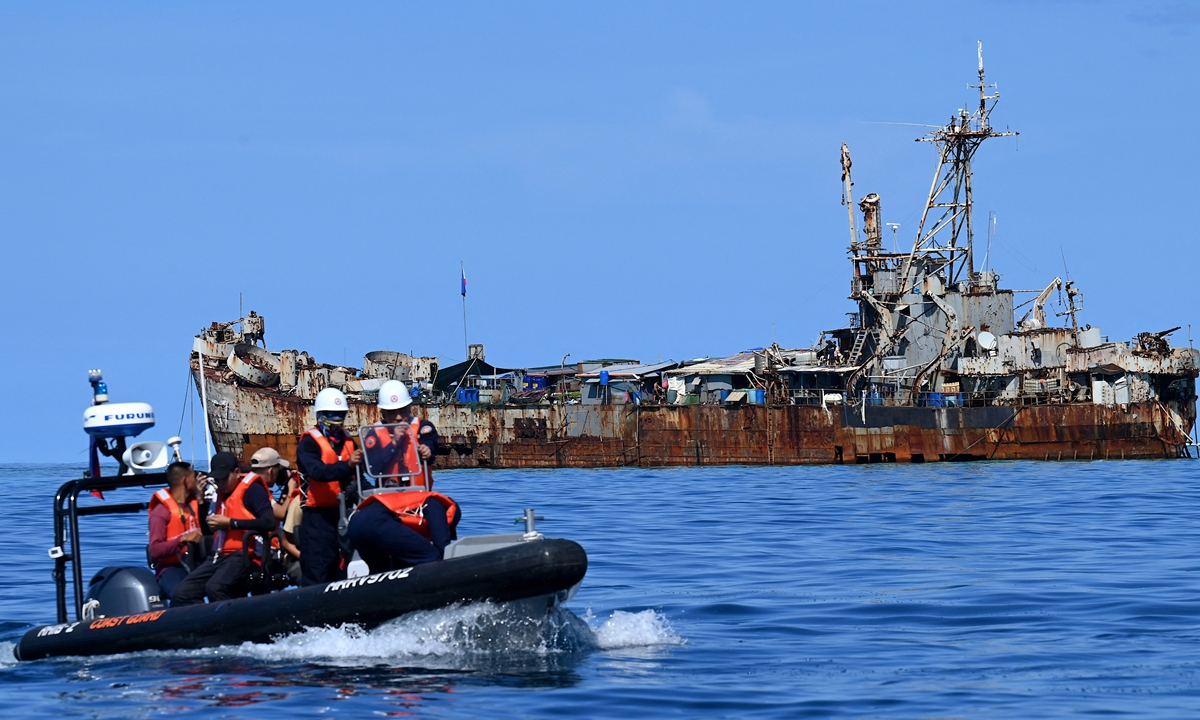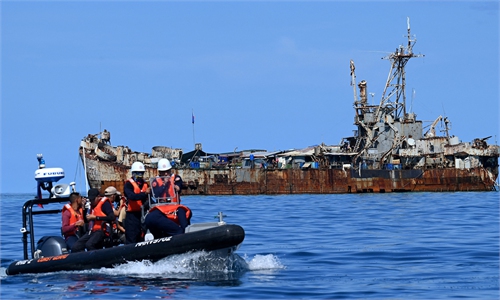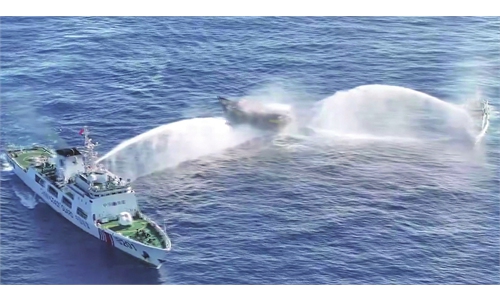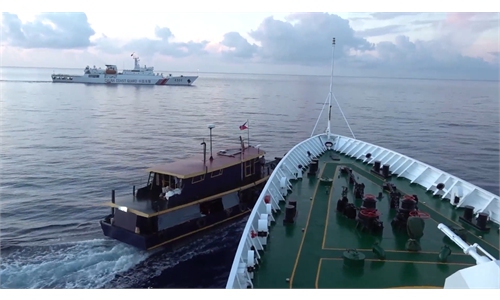IN-DEPTH / IN-DEPTH
Philippines likely to increase illegal resupply activities to grounded warship in Ren'ai Jiao in 2024: report

This photo taken on November 10, 2023 shows Philippine coast guard personnel and journalists sailing onboard a rigid inflatable boat (left) as they head back after filming the BRP Sierra Madre grounded at Renai Jiao in South China Sea. Photo: AFP
The Philippines, Vietnam and Malaysia have enhanced their infringement in the islands and reefs they illegally occupied in the South China Sea, according to a report Chinese think tank Grandview Institution released on Tuesday. Experts from the institution also warned of increasing illegal resupply activities by the Philippines to the illegally grounded warship in the South China Sea in 2024.
In recent years, China’s land reclamation and deployment of defensive military facilities on the islands and reefs in the South China Sea, out of its concern for maintaining national sovereignty and security, have been hyped up by the Western media as a testimony of the alleged "China threat" theory. Thereafter, the US and other extra-regional countries have been intensifying their interference, especially military interference, in the South China Sea issue. Their intervention has further worsened the maritime security environment in China’s periphery. In sharp contrast, the Western media turns a blind eye to the fact that Vietnam, the Philippines and Malaysia have occupied more than 40 islands and reefs in the Nansha Islands over the past four decades, and kept expanding land area, building facilities and deploying military capabilities on some of these islands, read the report.
In particular, Vietnam and the Philippines have further intensified their construction activities on occupied islands and reefs since 2022. Vietnam has carried out large-scale land reclamation on several islands and reefs, increasing the land area by three square kilometers, far exceeding the total construction scale of the past forty years. The Philippines has frequently attempted to reinforce its construction on the illegally grounded warship at the Ren'ai Jiao (Ren'ai Reef).
These actions have complicated and escalated the disputes, and have had an impact on peace and stability, the report said.
On May 9, 1999, the military vessel BRP Sierra Madre illegally intruded into China's Ren'ai Jiao, or what the Philippine side calls as the Second Thomas Shoal, running aground due to purported "technical difficulties."
According to the report, the vessel Sierra Madre has been grounded in the Ren'ai Jiao for a long time with over ten Filipino soldiers stationed and this has constituted actual encroachment of the Ren'ai Jiao. The Philippine military's Western Command is responsible for commanding the grounded troops and the Philippine Navy sends ships to resupply the grounded troop.
In 2022, the Philippine Navy conducted 11 illegal resupply activities to the Ren'ai Jiao, while in 2023, the number increased to 14 with more disguised approaches, according to the report.
Liu Xiaobo, director of the ocean research center of the Grandview Institution, told the Global Times that, before 2023, the Philippine Navy supplied the grounded military vessel once a month, but after that, the number of illegal resupply activities increased.
The current trend shows that the illegal supply actions in 2024 will continue to increase, according to Liu. "In order to reduce sensitivity, the Philippines has rented civilian ships - instead of sending military vessels - to supply the stranded ship under the escort of coast guard ships, but the Philippines has been reportedly taking advantage of the opportunity of resupplying troops to transport illegal construction materials to the grounded ship and China firmly opposed such attempt."
In addition, the Philippines currently invites international media to board transport ships and openly hype up China's so-called "interception actions" against them in order to gain sympathy and support from the international community. However, images accompanying the report show that compared to before, the main deck of the vessel Sierra Madre as been partially reinforced and renovated in 2023, indicating that the Philippines had secretly transported building materials long ago.
The report also points out that the Philippines has enhanced construction on the islands it occupied in the South China Sea. Apart from Ren'ai Jiao, the Philippines has illegally occupied eight islands and reefs in China's Nansha Islands, namely, Mahuan Dao, Feixin Dao, Zhongye Dao, Nanyao Dao, Beizi Dao, Xiyue Dao, Shuanghuang Shazhou, and Siling Jiao. In June 1978, it unilaterally went beyond its territorial scope to set up the so-called "Kalayaan Island Group," which violates China's territorial sovereignty.
Before 2022, the Philippines conducted less construction on the occupied islands and reefs. But in March 2022, the Philippines built a new helicopter landing pad on the Mahuan Dao; and in May of that year, the Philippine Coast Guard established command observation stations on the Mahuan Dao and others. These command observation stations monitor surrounding vessels and report information to the Philippine Coast Guard headquarters, according to the report.
In January 2024, Manila's military chief Romeo Brawner told media that the Philippines would develop islands in all the nine islands and reefs in the South China Sea that it considers part of its territory to make them more habitable for troops.
The Philippines Coast Guard recently claimed that China was attempting to build an "artificial island" in the Ren'ai Jiao. In response, Chinese Foreign Ministry spokesperson Wang Wenbin said at a press conference on Monday "the Philippines has repeatedly spread rumors, deliberately vilified China and tried to mislead the international community. None of those attempts will succeed."
Wang also urged the Philippines to stop making irresponsible remarks, face up to the facts and return to the right track of properly handling maritime disputes through negotiation and consultation.
Liu believes the Philippines will continue to advance its confrontational South China Sea policy in 2024. He points out that main factors contributing to the escalation of the disputes between China and the Philippines over the South China Sea include the pro-US stance of the Marcos government, the increased assistance from the US and its allies to the Philippines, as well as the joint defense commitment of the US-Philippines Mutual Defense Treaty that backs and encourages the Philippines' provocative actions of encroachment.
In addition, the Philippines has strengthened its maritime military capabilities in recent years, providing it with confidence, Liu said. But ASEAN countries will continue to be important forces in maintaining peace and stability in the South China Sea with China as resolving disputes through peaceful means and maintaining regional peace and stability remains a consensus between ASEAN countries and China despite the differences in their concerns and positions on the South China Sea issue, Liu noted.



